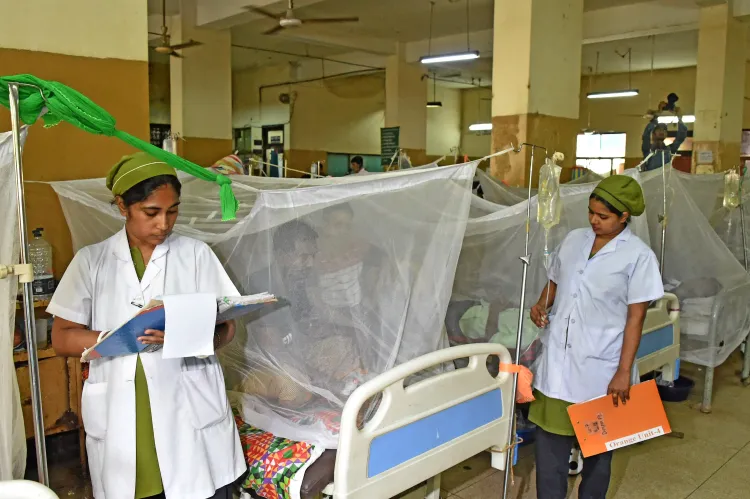What Are the Latest Dengue Fatalities in Bangladesh?

Synopsis
Key Takeaways
- 198 fatalities reported from dengue in 2025.
- 47,342 dengue cases recorded this year.
- New Dengue Dashboard launched for effective monitoring.
- Collaboration among stakeholders is essential for managing outbreaks.
- Support from UNDP boosts innovation in urban health.
Dhaka, Sep 30 (NationPress) Three additional individuals have succumbed to dengue in Bangladesh within the last 24 hours, pushing the total fatalities from this mosquito-induced illness in 2025 to 198 nationwide.
In the same timeframe, 556 new patients were hospitalized due to viral fever, bringing the aggregate number of infected individuals in 2025 to 47,342, as reported by the Directorate General of Health Services (DGHS), according to United News of Bangladesh (UNB).
The DGHS noted that new cases surfaced across various regions, including Barishal Division (137), Dhaka South City Corporation (DSCC) (113), Dhaka North City Corporation (DNCC) (101), Dhaka Division (79), Chattogram Division (70), Mymensingh Division (28), Rajshahi Division (25), and Sylhet Division (3).
In total, 575 fatalities were recorded due to dengue in Bangladesh during 2024. The year 2023 marked the deadliest period with 1,705 deaths attributed to dengue, while there were 321,179 cases and 318,749 recoveries reported that year.
Recently, the Dhaka North City Corporation (DNCC) introduced its Dengue Dashboard, a data-centric tool designed to revolutionize the monitoring and management of outbreaks by city authorities. Developed through the DNCC Innovation Lab with assistance from the United Nations Development Programme (UNDP), this dashboard aims to provide actionable insights for timely interventions and raise public awareness regarding dengue prevention, as stated by UNB.
DNCC Administrator Mohammad Azaz emphasized, "The Dengue Watch dashboard transcends mere functionality; it represents a transformative approach for DNCC to evolve into a digitally-driven, transparent, and accountable body. By leveraging innovation, we can harmonize health, environment, and governance to cultivate a smarter, healthier Dhaka."
UNDP Resident Representative in Bangladesh Stefan Liller reiterated their commitment to supporting innovations in urban health management, stating, "It is an honor for UNDP to back DNCC's innovation initiatives. The Innovation Lab, established in 2025, aims to become a hub for intelligent, scalable, and citizen-focused urban solutions. The Dengue Watch Dashboard exemplifies what is achievable when local leadership, data, and innovation converge."
This tool was presented during a keynote session, followed by a panel discussion involving stakeholders from DGHS and other partners, including representatives from the health ministry, city corporations, development partners, and startups. The press release indicated that participants concurred on the necessity for stronger collaborations, real-time data, and a visionary outlook for resilient urban health in the fight against vector-borne diseases like dengue.










